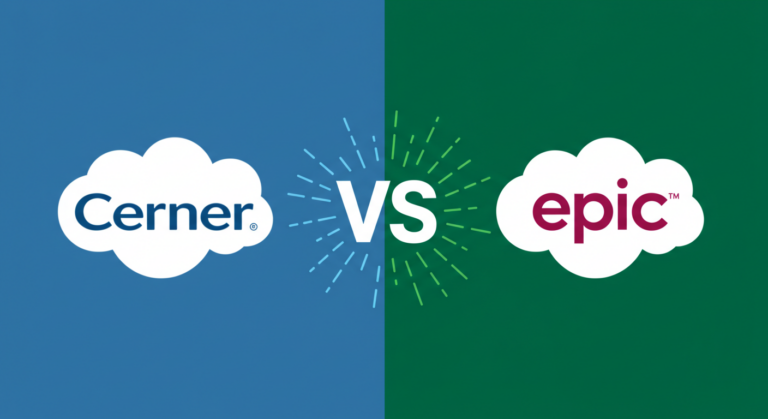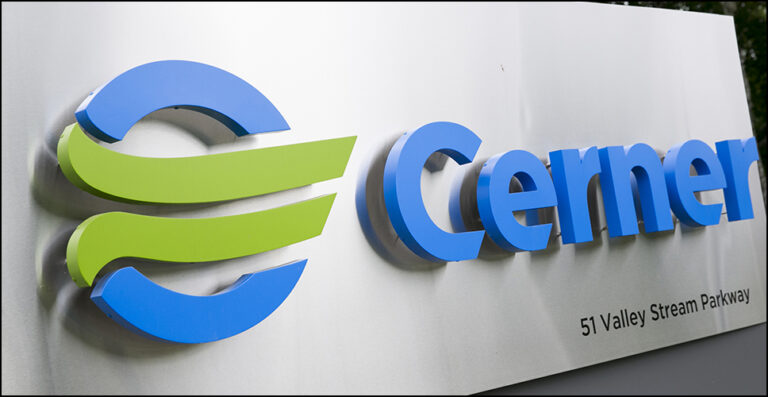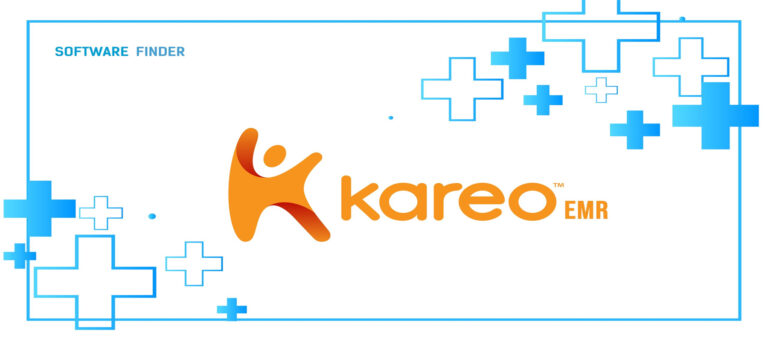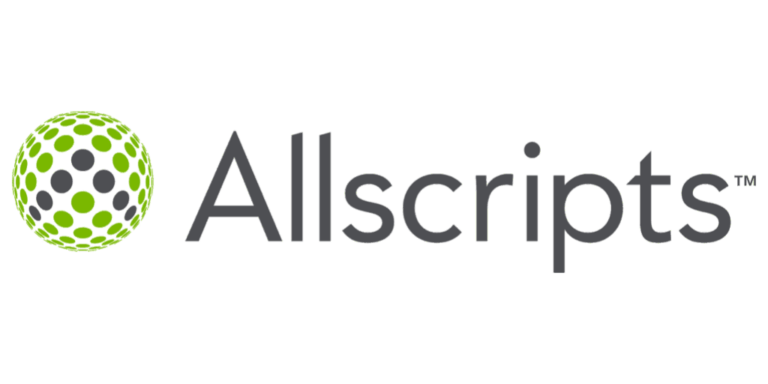Quick Comparison Summary
| Feature | Cerner | Epic |
|---|---|---|
| Market Focus | Acute care hospitals, smaller facilities | Large health systems, HIMSS Stage 7 hospitals |
| Price Point | More affordable, lower maintenance costs | Higher investment, costlier implementation |
| User Experience | Simpler interface, steeper learning curve | Feature-rich, potentially overwhelming |
| Interoperability | CommonWell Health Alliance, Cerner Ignite APIs | Care Everywhere, Care Quality Network |
| Best For | Organizations seeking cost-effective solutions | Large systems needing comprehensive features |
| Patient Portal | HealtheLife (health tracking focus) | MyChart (payment options focus) |
Introduction: Understanding Today’s EHR Market Leaders
Electronic health record (EHR) systems play a crucial role in patient care and administrative efficiency. According to a 2023 KLAS Report, Cerner and Epic stand out as dominant forces, collectively controlling over 50% of the American hospital market.
The Healthcare Information and Management Systems Society (HIMSS) recognizes both systems as leading solutions for digital health record management. For healthcare providers evaluating these platforms, understanding their unique strengths, capabilities, and limitations is essential for making an informed decision.
This comprehensive guide compares Cerner and Epic across multiple dimensions, from market presence and target clients to specific features, user experience, and pricing considerations.
Market Presence and Target Clients
Both Cerner and Epic have established themselves as industry leaders, but they serve slightly different segments of the healthcare market:
Cerner
- Onboarded 71 new clients in 2021 alone
- Primary focus on acute care hospitals
- Serves diverse healthcare practitioners
- Suitable for organizations of various sizes, including ambulatory care units
Epic
- Preferred choice for HIMSS Stage 7 hospitals (highest level of EHR adoption)
- Popular among specialty clinics and retail clinics
- Serves various medical specialists and healthcare organizations
- Well-suited for multi-specialty groups, rehabilitation centers, transitional care facilities, hospice care, and retail clinics
- Consistently ranks high in user satisfaction
Feature Comparison
Let’s explore how these two platforms compare across key functionality areas important to healthcare providers:
| Feature | Cerner | Epic |
|---|---|---|
| Scheduling | Patient-oriented automated scheduling | Dynamic visit scheduling |
| Workflow | Streamlined intake workflows | Pre-authorization and referral management |
| Financial | Comprehensive patient accounting | Electronic insurance coverage verification |
| Focus | Patient-centered approach | Administrative efficiency |
Patient Portals
Both systems offer robust patient portals with Cerner’s HealtheLife and Epic’s MyChart, providing:
- Secure messaging with providers
- Appointment scheduling
- Access to personal health records
- Bill payment options
Cerner HealtheLife additional features:
- Personalized health assessments
- Tools for tracking health metrics
Epic MyChart additional features:
- Extended payment options
- Insurance options
- Payment plan arrangements
- Financial assistance resources
Charting Capabilities
Both systems provide effective solutions for managing patient data with quick and easy access, but with different approaches:
Cerner:
- Time-saving features for efficient access
- Focus on minimizing charting time
- Maximizes time for patient interaction
Epic:
- Simplified charting and review processes
- Comprehensive approach with multiple features:
- Patient history tracking
- Medical templates
- Referral management
- Specialized dental software
- Enhanced patient data access and utilization
Telehealth Services
As remote healthcare becomes increasingly important, both platforms support virtual care with different strengths:
Cerner:
- Video visits
- Text communication during appointments
- Enhanced accessibility features
Epic:
- Patient-centric app
- Integration with home monitoring devices
- Comprehensive care management approach
Interoperability and Integration
Both systems prioritize interoperability but implement it through different initiatives:
Cerner:
- CommonWell Health Alliance participation
- Cerner Ignite APIs
- Smooth data exchange capabilities compliant with ONC interoperability rules
- Integration with third-party apps and systems
- Oracle acquisition potentially improving cloud infrastructure (as reported by Healthcare IT News)
Epic:
- Epic Care Everywhere Network
- Carequality Framework participation
- “Share Everywhere” functionality
- Seamless data sharing among practitioners
- Patient empowerment for sharing health information with external providers
- Meets 21st Century Cures Act requirements for interoperability

User Experience and Interface
The user experience differs considerably between the two platforms:
Cerner PowerChart
- Simple, intuitive dashboard
- Mobile compatibility
- Some users report basic tasks can be time-consuming
- Training typically required
- Patient portal facilitates easy communication
- Navigation can be challenging for some users
Epic
- Feature-rich interface that may overwhelm non-technical users
- Offers extensive customization options
- Support often needed during setup
- Patient portal allows appointment scheduling and secure record viewing
- Complexity might be a barrier for users seeking simpler solutions
Pricing and Affordability
While exact pricing details aren’t publicly disclosed for either system, there are notable differences in their cost structures:
Cerner
- Generally more affordable compared to Epic
- Lower expenses for setup, maintenance, and hardware updates
- No free trial or free version offerings
- Requires upfront investment for system familiarity
Epic
- Relatively higher price point than Cerner
- Potential additional expenses for healthcare compliance consulting and HIA audit services
- Preferred by major healthcare entities despite higher costs
- Exact pricing remains undisclosed and varies by implementation
Making the Right Choice for Your Organization
When deciding between Cerner and Epic, healthcare organizations should consider:
- Organizational size and type: Epic may be more suitable for larger healthcare systems, while Cerner might be more appropriate for smaller facilities seeking cost-effective solutions.
- Budget constraints: Organizations with tighter budgets might lean toward Cerner’s more affordable pricing structure.
- Specific feature requirements: Compare the specific features most critical to your practice against each system’s strengths.
- User technical proficiency: Consider your staff’s technical abilities and training resources when evaluating the learning curve for each system.
- Integration needs: Assess which platform better aligns with your existing systems and interoperability requirements.
Conclusion
Both Cerner and Epic offer robust EHR solutions with distinct advantages. Cerner stands out for its affordability, interoperability initiatives, and focus on efficient workflows, while Epic excels with its comprehensive feature set, specialized tools, and strong presence in larger healthcare systems.
By carefully evaluating your organization’s specific needs, budget constraints, and long-term goals, you can determine which of these industry-leading EHR systems will best support your healthcare delivery mission and improve patient outcomes.
Get Free EMR Price Quotes
When you collaborate with EMRGuides and utilize our complimentary EMR price quote service, you’re investing in more than just cost savings. You’re demonstrating your dedication to exceptional patient care, supporting your clinical team, and ensuring the sustainable growth and prosperity of your healthcare practice.
Additional Resources from High Authority Sources
For more in-depth information about these EHR systems, we recommend consulting these authoritative resources:
- KLAS Research EHR Performance Reports – Independent research on EHR performance and user satisfaction
- HealthIT.gov – Official government resource on electronic health records
- HIMSS Analytics – Healthcare Information and Management Systems Society research and insights
- Office of the National Coordinator for Health Information Technology – Resources on certified health IT products






